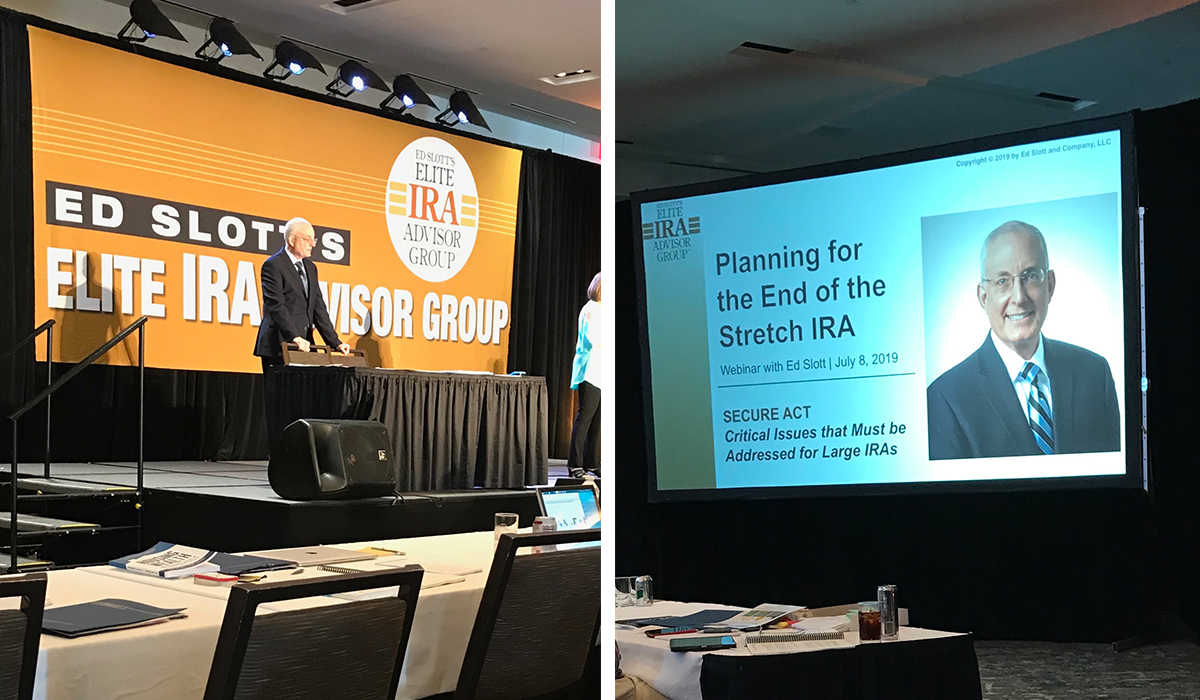Members of Ed Slott’s Master Elite IRA Advisor GroupSM Studied Latest Retirement Account Planning Strategies, Estate Planning Techniques and Tax Laws at Semiannual Workshop
Greg Storen completed the semiannual training with America’s IRA Experts at Ed Slott and Company, LLC in Dallas, Texas on September 19-21, 2019. The workshop, which was attended by members of Ed Slott’s Master Elite IRA Advisor GroupSM, provided in-depth technical training on advanced retirement account planning strategies, estate planning techniques and new tax laws, as well as a proactive look at legislation currently being considered by Congress that would bring significant changes to the way Americans plan for retirement.
“Right now, the SECURE Act has passed the House by an overwhelming 417-3 margin and is with the Senate for consideration. If passed as written, it would dramatically impact key retirement planning strategies,” said Ed Slott, CPA, founder of Ed Slott and Company and a nationally recognized IRA expert who was named “The Best Source for IRA Advice” by The Wall Street Journal. “As a member of our advanced training program for 15 years, Storen is part of an exclusive group of elite financial professionals that have continuously prioritized their retirement planning education. With this ongoing training, Storen can offer the latest insight on how best to prepare for any necessary updates their financial plan may need.”
Training highlights from this event included: 2019 year-end tax planning strategies, such as qualified business income deductions, coordination with retirement accounts and qualified charitable distributions; tax breaks for company stock using net unrealized appreciation (NUA,) including key evaluation criteria, timelines, triggering events, and a recommendation protocol for advising if NUA is in a client’s best interest; key considerations of gifting strategies under current gift and estate laws; a look at advanced case studies and rulings, including 60-day rollover pitfalls; the use of QDROs for dividing retirement assets in a divorce; income in respect of a decedent (IRD) procedures; ABLE Account changes from the Tax Cuts and Jobs Act, rules, advantages, and disadvantages for special needs planning; 2019 changes to lump sum payouts from defined benefit plans, and more.
Training was provided by Ed Slott and Company’s team of retirement experts, including Ed Slott, CPA; Sarah Brenner, JD; Andy Ives, CFP®, AIF®; and newest team member, ERISA attorney, Ian Berger, JD. Ed Slott and Company and many of the advisors in Ed Slott’s Master Elite IRA Advisor GroupSM are the go-to resources for attorneys, CPAs and other financial advisors because of their in-depth knowledge and expertise in all areas of retirement accounts and income planning. This workshop also provided approved continuing education (CE) credit through American College, CFP® Board, IRS and CPE for retirement savings and income planning, federal tax law topics and general financial education.
Members of Ed Slott’s Master Elite IRA Advisor GroupSM have year-round access to Ed Slott and Company’s team of retirement experts for consultation on advanced planning topics. The membership also includes step-by-step processes, including the Complete IRA Care Solution™ 30-module planning guide. Members also have access to proprietary worksheets, pamphlets and presentations, including The NUA Timeline, 2019 Halftime Strategy Report, Ed Slott’s 2019 Retirement Decisions Guide and Planning for the End of the Stretch IRA that they can use when working with clients.
“From natural disasters and market volatility to evolving legislation, there are so many rapidly changing factors impacting retirement and tax planning today. These changes can have a significant and costly impact on one’s retirement savings,” said Storen. “Through my membership with Ed Slott and Company, I am constantly studying the latest retirement laws and strategies. At these workshops, I am collaborating with some of the best financial minds in the country and constantly discovering new ways to provide the most tax-advantageous strategies possible to my clients.”
“One of the biggest proposed changes Congress is considering is eliminating the Stretch IRA,” said Slott. “This could mean the difference of millions of dollars for beneficiaries over the long-term. Regardless of how this legislation pans out, the potential for this change should be triggering critical conversations between Americans and their financial advisors, particularly those with large IRAs. From re-evaluating beneficiaries to effective tax bracket management techniques, plans should be reviewed today to properly prepare for changes that could be enacted tomorrow. The members of our organization are well-trained, qualified professionals that prioritize both their ongoing education as well as their clients’ individual needs.”
Have questions about any of this information? Give us a call now!
ABOUT ED SLOTT AND COMPANY, LLC: Ed Slott and Company, LLC is the nation’s leading provider of technical IRA education for financial advisors, CPAs and attorneys. Ed Slott’s Elite IRA Advisor GroupSM is comprised of more than 400 of the nation’s top financial professionals who are dedicated to the mastery of advanced retirement account and tax planning laws and strategies. Slott is a nationally recognized IRA distribution expert, best-selling author and professional speaker. He has hosted several public television specials, including “Retire Safe & Secure! with Ed Slott.” Visit irahelp.com for more information.
The opinions voiced in this material are for general information only and are not intended to provide specific advice or recommendations for any individual. This information is not intended to be a substitute for specific individualized tax advice. We suggest that you discuss your specific tax issues with a qualified tax advisor. Traditional IRA account owners should consider the tax ramifications, age and income restrictions in regards to executing a conversion from a Traditional IRA to a Roth IRA. The converted amount is generally subject to income taxation.

